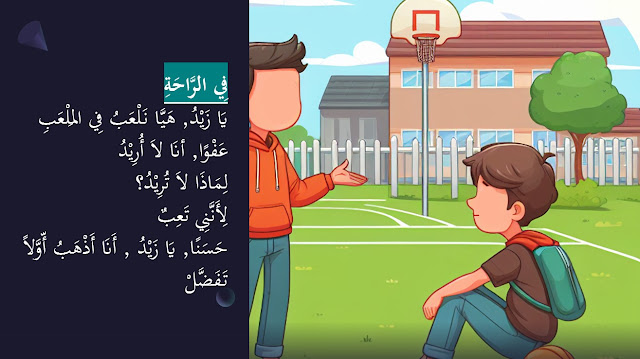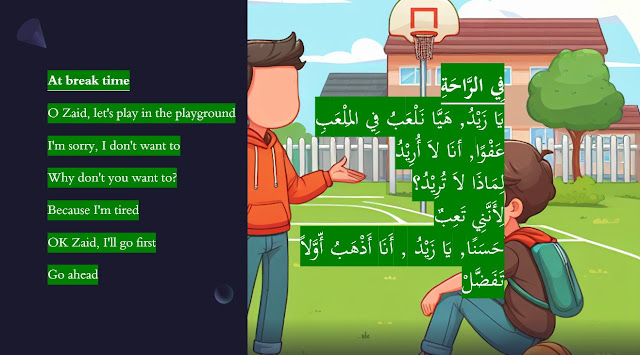Learning daily conversation in Arabic from a dialogue between friends at school
Mastering the basics of a language is all about immersion. While textbooks and grammar drills are essential, nothing beats real-life examples to truly grasp how language is used in everyday situations.
To illustrate this, let’s look at a practical example of a daily conversation in Arabic. In this article, I will show you an example of a daily conversation in Arabic at school between two friends, specifically a conversation between two friends during break time.
I will also provide you with the English translation, so you can understand the meaning of each sentence. Then, I will explain some of the key words and phrases that are used in the conversation, such as the noun form, verb form, root verb, and more.
By the end of this article, I hope you will be able to master Arabic from a simple dialogue between two friends.
The scene
Two friends, Zaid and his friend, are enjoying a break at school. Their brief conversation offers a valuable glimpse into common Arabic phrases and expressions used.
The Dialogue
Here is the dialogue between two friends in the school at break time in Arabic with English translation:
فِي الرَّاحَةِ
At break time
يَا زَيْدُ, هَيَّا نَلْعَبُ فِي المَلْعَبِ
O Zaid, let's play in the playground
عَفْوًا, أنَا لاَ أُرِيْدُ
I'm sorry, I don't want to
لِمَاذَا لاَ تُرِيْدُ؟
Why don't you want to?
لِأَنَّنِي تَعِبٌ
Because I'm tired
حَسَنًا, يَا زَيْدُ , أَنَا أَذْهَبُ أّوَّلاً
OK Zaid, I'll go first
تَفَضَّلْ
Go ahead
Explanation
Let's break down the dialogue and understand the vocabulary and grammar used in this conversation between two friends in Arabic.
1. فِي الرَّاحَةِ (At break time)
'فِي' is a preposition that means "in" or "at". 'الرَّاحَةِ' is a noun that means "break" or "rest". The "ال" at the beginning is the definite article "the".
2. يَا زَيْدُ
'يَا' in this context is called 'ya munada'. We use ya munada to call someone or summon someone in Arabic uslub.
ya munada (or usually people say 'harf munada') is called 'vocative particle' in English language.
The word يَا (ya) means "O" or "hey", and it is followed by the name of the person.
The name زَيْد (Zaid) is a common Arabic name for boys.
Vocative particle (harf munada) basic concept
- a noun following 'يَا' has only one dammah (has no tanwin).
You can notice in the conversation above. It is written 'يَا زَيْدُ'.
Recap
يَا زَيْدٌ (ya zaidun) => incorrect
يَا زَيْدُ (ya zaidu) => correct
You should read more about the ya munada basic concept here:
- Durusul lughah book 1 lesson 5
- al-munada
3. هَيَّا نَلْعَبُ
This is a way of inviting someone to do something in Arabic. The word هَيَّا (haya) means "come on" or "let's go", and it is used to express enthusiasm or urgency. The word 'نَلْعَبُ' is the first person plural form of the verb 'لَعِبَ', which means "to play".
4. عَفْوًا
This is a way of saying "sorry" or "excuse me" in Arabic. The word عَفْوًا (afwan) is derived from the root verb عَفَا ('afa) which means 'forgive', 'pardon'.
5. أنَا لاَ أُرِيْدُ
'أنَا' is the pronoun 'I'. "لاَ أُرِيْدُ" is a negation of the verb "أُرِيْدُ", which means "I want". The "لاَ" before it negates the verb, so it means "I don't want".
6. لِمَاذَا لاَ تُرِيْدُ؟
The meaning is 'Why don't you want to?'. "لِمَاذَا" is the interrogative particle "why". "لاَ تُرِيْدُ" is the same as above, but in the second person, so it means "you don't want".
7. لِأَنَّنِي
This is a way of saying "because" or "for" in Arabic. The word لِأَنَّنِي (li-annani) is composed of two parts: لِ (li) and أَنَّنِي (annani).
The word لِ (li) is a preposition that means "for" or "to". The word أَنَّنِي (annani) is a conjunction that means "that I" or "because I".
The word أَنَّنِي (annani) is formed by adding the suffix نِي (ni), which means "I", to the word أَنَّ (anna), which means "that" or "because".
Notes:
We may say لِأَنِّي (li-anni) instead of 'لِأَنَّنِي' (li-annani).
8. تَعِبٌ
This is a way of saying "tired" or "exhausted" in Arabic. The word تَعِبٌ (ta'ibun) is derived from the verb تَعِبَ (ta'iba), which means "to be tired".
9. حَسَنًا, يَا زَيْدُ , أَنَا أَذْهَبُ أّوَّلاً
The meaning is 'OK Zaid, I'll go first.
"حَسَنًا" is a noun that means OK, fine, all right; good; well.
"أَذْهَبُ" is the first person singular form of the verb "ذَهَبَ", which means "to go".
"أّوَّلاً" is an adverb that means "first".
10. تَفَضَّلْ
This is a way of saying "go ahead" or "please" in Arabic. The word تَفَضَّلْ (tafadhal) is a polite expression that is used to offer something to someone or to invite someone to do something.
Let's break down the conversation and delve into the linguistic aspects:
1. Invitation:
يَا زَيْدُ, هَيَّا نَلْعَبُ فِي المَلْعَبِ
O Zaid, let's play in the playground.
This opening line uses the vocative particle "يا" followed by Zaid's name. The verb "نَلْعَبُ" comes from the root لَعِبَ meaning "to play" and is conjugated in the first-person plural form, inviting Zaid to join the speaker.
2. Decline:
عَفْوًا, أنَا لاَ أُرِيْدُ
I'm sorry, I don't want to.
Zaid politely declines the invitation using the word "عَفْوًا" for "sorry" and the negative verb "لاَ أُرِيْدُ". This verb is formed from the root أَرَادَ meaning "to want" and conjugated in the first-person singular fi'l mudari' form with the negative particle "لاَ".
3. Inquiry:
لِمَاذَا لاَ تُرِيْدُ؟
Why don't you want to?
Curious about Zaid's reason for declining, the speaker asks "لِمَاذَا" meaning "why".
4. Response:
لِأَنَّنِي تَعِبٌ
Because I'm tired
Zaid explains his reason using the conjunction "لِأَنَّ" meaning "because" and the fa'il "تَعِبٌ" meaning "a person who is tired". This word is derived from the verb تَعِبَ meaning "to be tired" and agrees with Zaid's singular noun form.
5. Farewell:
حَسَنًا, يَا زَيْدُ , أَنَا أَذْهَبُ أّوَّلاً
OK Zaid, I'll go first.
Accepting Zaid's reason, the speaker bids farewell using the interjection "حَسَنًا" meaning "OK" and the verb "أَذْهَبُ" meaning "I go" in the first-person singular fi'l mudari' form.
The phrase "أذْهَبُ أّوَّلاً" translates to "I'll go first" with the adverb "أّوَّلاً" indicating the speaker's intention to leave first.
تَفَضَّلْ
Go ahead
Zaid politely responds with "تَفَضَّلْ" meaning "go ahead" or "please do", acknowledging the speaker's farewell.
This simple dialogue demonstrates the basic structure of Arabic conversation and introduces several common words and phrases.
By analyzing the root verbs, noun forms, and grammatical structures, you can gain valuable insights into how Arabic language works in everyday situations. Let's study them now.
The word forms
1. رَاحَةٌ (raahatun) is noun.
2. نَلْعَبُ is the first person plural fi'l mudari' form.
The root verb is لَعِبَ (la'iba) => 'لَعِبَ' is fi'l madi form.
Fi'l mudari':يَلْعَبُ (yal'abu)
Fi'l amr: اِلْعَبْ (il'ab)
Masdar: لَعِبٌ (la'ibun)
Fa'il: لَاعِبٌ (laa'ibun)
Maf'ul: مَلْعُوْبٌ (mal'ubun)
Ism makan: مَلْعَبٌ (mal'abun)
3. عَفْوًا is noun.
The root verb is عَفَا ('afaa) => 'عَفَا' is fi'l madi form.
عَفَا is usually paired with 'عَنْ' wich means 'to forgive'.
Sentence example: عَفَا اللهُ عَنْكَ ('afallah 'anka which means 'May Allah forgive you').
Fi'l mudari: يَعْفُو (ya'fuu)
Fi'l amr: اُعْفُ (u'fu)
Masdar: عَفْوًا ('afwan)
Fa'il: عَافٍ ('aafin)
Maf'ul: مَعْفُوٌّ (ma'fuwwun)
4. أُرِيْدُ is first person singular fi'l mudari' form.
The root verb is أَرَادَ (araada) => 'أَرَادَ' is fi'l madi form.
Fi'l mudari': يُرِيدُ (yuriidu)
Fi'l amr: أَرِدْ (arid)
Masdar: إِرَادَةٌ (iraadatun)
Fa'il: مُرِيْدٌ (muriid)
Maf'ul: مُرَادٌ (muraad)
5. لِماذا
كَلِمَةٌ مُرَكَّبَةٌ مِنْ لاَمِ التَّعْلِيلِ وَمَا الاِسْتِفْهَامِيَّةِ وَذَا الْإِشَارِيَّةِ
لِماذا contains lam ta'lil, ma istifhamiyyah, and dha ishaarah.
"لِماذا" is an Arabic word that translates to "why" in English. It is used to inquire about the reason or cause of something.
6. تُرِيْدُ in this context is second person masculine singular fi'l mudari form.
The root verb is أَرَادَ (araada) => 'أَرَادَ' is fi'l madi form.
Fi'l mudari': يُرِيدُ (yuriidu)
Fi'l amr: أَرِدْ (arid)
Masdar: إِرَادَةٌ (iraadatun)
Fa'il: مُرِيْدٌ (muriid)
Maf'ul: مُرَادٌ (muraad)
7. تَعِبٌ (ta'ibun) is noun.
The root verb of ta'ibun is تَعِبَ (ta'iba) => 'تَعِبَ ' is fi'l madi form.
Fi'l mudari: يَتْعَبُ (yat'abu)
Fi'l amr: اِتْعَبْ (it'ab)
Masdar: تَعَبٌ (ta'abun)
Fa'il: تَعِب (ta'ibun)
8. أَذْهَبُ (adh-habu) is 1st person singular fi'l mudari' form.
The root verb of adh-habu is ذَهَبَ (dhahaba) => 'ذَهَبَ' is fi'l madi form.
Fi'l mudari: يَذْهَبُ (yadh-habu)
Fi'l amr: اِذْهَبْ (idh-hab)
Masdar: ذَهَابٌ (dhahaabun)
Fa'il: ذَاهِبٌ (dhaa-hibun)
Maf'ul: مَذْهُوبٌ (madh-huubun)
9. تَفَضَّلْ (tafaddal) is fi'l amr form for 2nd person, singular, masculine (أَنْتَ/you)
The root verb is: تَفَضَّلَ (tafaddala) => 'تَفَضَّلَ' is fi'l madi form.
Fi'l mudari: يَتَفَضَّلُ (yatafaddalu)
Fi'l amr: تَفَضَّلْ
Masdar: تَفَضُّلٌ (tafaddulun)
Fa'il: مُتفضِّل (mutafaddilun)
Maf'ul: مُتفضَّلٌ (mutafaddalun)
The Conclusion
We hope you enjoyed this article and learned a lot from it. Now you know how to have a daily conversation in Arabic at school with your friends.
You also learned some of the important words and phrases that are used in the conversation, and how they are formed and used in Arabic.
You can practice this dialogue with your friends or classmates, and try to use the words and phrases in different situations. By doing so, you will improve your Arabic skills and become more fluent in the language. Thank you for reading, and happy learning!




Masha-allah 🙏 wishing you the best of luck 🤲
ReplyDeleteAamiin.. Hopefully, you will get a lot of benefits from this article.
Delete